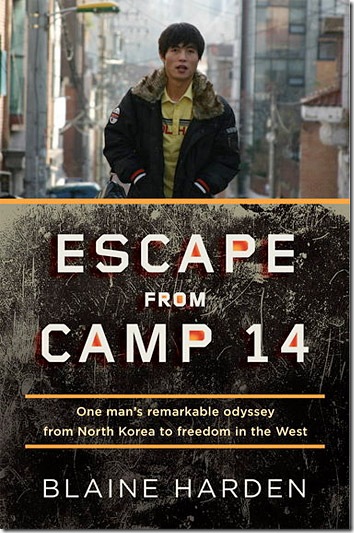 The horrors described in Escape from Camp 14 are so extreme that one might assume this is a work of fiction.
The horrors described in Escape from Camp 14 are so extreme that one might assume this is a work of fiction.
But the sad reality is that this is a spellbinding true account of life inside a North Korean prison camp, told from the viewpoint of Shin Dong-hyuk, who was born in Camp 14 and fled to the West after a dramatic escape that defies the imagination.
In spare prose Blaine Harden describes Shin’s life as the child of two prisoners who were permitted to mate, with the expectation that any children they bore would spend their entire lives inside the prison complex, surrounded by electric wire designed to kill anyone who touched it.
Human-rights groups believe that as many as 200,000 people are held captive in six sprawling prisons, which the author compares to Nazi concentration camps. Hundreds of thousands of inmates are believed to have perished in the North Korea camps, the largest of which is 31 miles long and 25 miles wide, bigger in area than Los Angeles.
After Shin’s mother and brother hatched an escape plan, guards tortured Shin to find out what he knew. They first hung him upside down from the ceiling, and then hoisted him over a fire, gradually lowering him until his flesh burned. He passed out. Shin and his father were later forced to watch as guards executed Shin’s mother and brother.
At various times, Shin worked in a coal mine, a pig farm, and a garment factory, where his duty was to carry broken sewing machines up stairs to a repair shop. When he once dropped a machine, breaking it, an angry prison official sliced off part of one of his fingers.
Inmates suffered from constant hunger. If soup spilled on the floor, Shin would lick it up. Inmates ate rats, frogs, snakes and insects to stay alive.
When Shin was 6, a guard surprised students by searching their pockets. When he found five kernels of corn in a girl’s pocket, he beat her on the head until she toppled, bleeding, onto the floor. She died that night.
Growing up in an enclosed totalitarian state, Shin had no concept of what might lie beyond North Korea’s borders, until the day he met a political prisoner named Park who had traveled abroad. They became friends and plotted an escape in early 2005.
One day they were assigned to cut firewood near the perimeter fence. When no one was looking, Park tried to squeeze between two horizontal wires one foot apart, but when he accidentally touched a wire, the electric current killed him. His limp corpse pushed the lower wire down, which allowed Shin to crawl over his friend’s body to freedom.
Their plan had been to flee to China, but without Park, Shin was lost. Harden conveys the drama of Shin’s long trek to the border. His escape and flight seem so risky and wildly improbable that one marvels he pulled it off.
Shin eventually made his way to South Korea and then to the United States. He suffered from depression and nightmares, and assumed that interrogators had tortured and perhaps killed his father because of Shin’s escape.
Harden had doubts about the story after Shin admitted he lied when he claimed he knew nothing about his mother and brother’s escape plan. In fact, he had overheard them discussing it. Harden verified Shin’s account of prison camp conditions by talking to human rights groups and others. The bruises, burns and scars on his body also testified to the extreme abuse he had suffered.
Escape from Camp 14 is timely because of North Korea’s ongoing belligerence and threats, and its recent unsuccessful attempt to launch a satellite into orbit, despite pressure from the United States and other nations.
Harden has written an eye-opening book about a hermetically sealed society, where a family dynasty stays in power through iron rule and citizen paranoia based on fear of being sent to one of the brutal prison camps.
Bill Williams is a freelance writer in West Hartford, Conn., and a former editorial writer for The Hartford Courant. He is a member of the National Book Critics Circle and can be reached at billwaw@comcast.net.
Escape from Camp 14: One Man’s Remarkable Odyssey from North Korea to Freedom in the West, by Blaine Harden; Viking, 205 pp., $26.95.